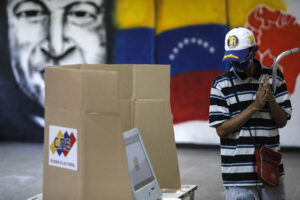On February 29, United States based human rights and religious organizations, Washington Office on Latin America, U.S.-El Salvador Sister Cities, SHARE Foundation, Maryknoll Office for Global Concerns, Latin America Working Group, InterReligious Task Force on Central America (IRTF), Hope Border Institute, Due Process of Law Foundation, and the Committee in Solidarity with the People of El Salvador wrote to the U.S. Secretary of State to express concerns about the state of democracy in El Salvador and, specifically, reports of systematic irregularities in the February 4 presidential and legislative elections.
The groups highlighted that, in addition to Bukele’s re-election being unconstitutional, the February elections evidenced systematic violations of El Salvador’s own laws and established electoral procedures, and of international democratic standards. The concerns were so widespread that several members of the Supreme Electoral Tribunal publicly distanced themselves from decisions being made and all opposition parties petitioned for the legislative process to be annulled.
The organizations urged the State Department to call on the Salvadoran authorities to give a clear accounting in response to these concerns, and “to make clear to the Salvadoran people prior to the March 3 elections that the United States’ commitment to electoral integrity requires both transparency and accountability.”
Of particular concern were reports of intimidation and dominance by the governing Nuevas Ideas party throughout the electoral process, to the point of usurping the role of the Supreme Electoral Tribunal (TSE) as the institutional arbiter, raising questions as to whether the results the TSE delivered following the elections are reliable. Together with the reforms previously approved by Bukele’s party to radically redraw the electoral map, and undermine local representation and the participation of smaller political parties, the result is a disproportionately high concentration of power by Bukele’s party in the legislative branch for the upcoming 2024-2027 period.
Writing, “These significant concerns jeopardize the public’s trust in the fairness of future elections in El Salvador and the veracity of their results,” the groups called on the U.S. to “privately and publicly echo the concerns that opposition political parties, civil society organizations, and international observer missions have raised about the 2024 elections, and, more broadly, over Bukele’s party’s attacks on El Salvador’s democratic norms and institutions.”
The groups also expressed support for an Organization of American States audit of the February 4 elections and international investigation into allegations of interference regarding the materials, including electronic systems, that were distributed on Election Day and the resulting collapse, which halted the transmission of results and opened the door to potential manipulation of data.

